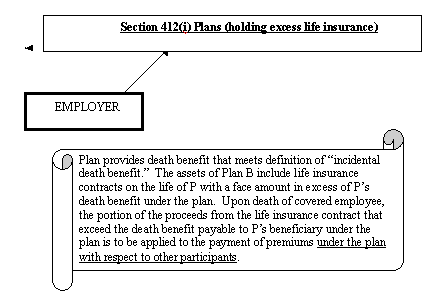LISTED TRANSACTIONS
Listed Transaction #28
(Abusive 412(i) Plans)
Abusive Section 412(i) Plans with Excessive Life Insurance
IRS Rev. Ruling 2004-20

As a general rule, employers can claim tax deductions for contributions that are used by the plan to pay premiums on an insurance contract covering an employee. The IRS has learned that some firms have promoted arrangements by which contributions made to a 412(i) plan have been used to purchase specially designed life insurance contracts which are generally made available only to highly compensated employees. Here, the contracts are designed so that the cash surrender value is temporarily depressed to a level significantly below premiums paid, then sold or distributed to an employee at the depressed cash surrender value. Following the transfer, the cash surrender value increases substantially, allowing the employer to take a tax deduction far in excess of what the employee recognizes in income. Proposed regulations issued by the IRS make it clear that any life insurance contract transferred from an employer or a tax-qualified plan to an employee must be taxed at its full fair market value. The IRS is trying to put an end to those who use policy design and contractual provisions to: (1) under report the value of life insurance policies distributed or sold from a qualified retirement plan; (2) increase an employer’s front-end tax deductions; or (3) provide bloated and discriminatory benefits to highly compensated plan participants, particularly owner-employees.
For more information, please see Rev. Rul. 2004-20, Rev. Rul. 2004-21, and Rev. Proc. 2004-16. Also, see Simmons & Leimberg, “Prop.Regs. Address Abusive Transactions Involving Life Insurance in Qualified Plans,” Est. Plan. Journal (WG&L)(April 2004)(explaining the significant guidance and implications of IRS’ efforts to eliminate abusive transactions involving life insurance).
For those plans in which an employer has deducted amounts used to pay premiums on a life insurance contract for a participant with a death benefit under the contract that exceeds the participant’s death benefit under the 412(i) plan by more than $100,000, the transaction (and transactions that are substantially similar thereto) is a listed transaction, requiring disclosure to the IRS.
If you believe that you may have engaged in a transaction that is the same or substantially similar to the transaction described above, Federal law may require you to disclose your and other parties’ participation in any such “listed transaction” on IRS Form 8886. For more information about Federal law requirements, please contact us.
